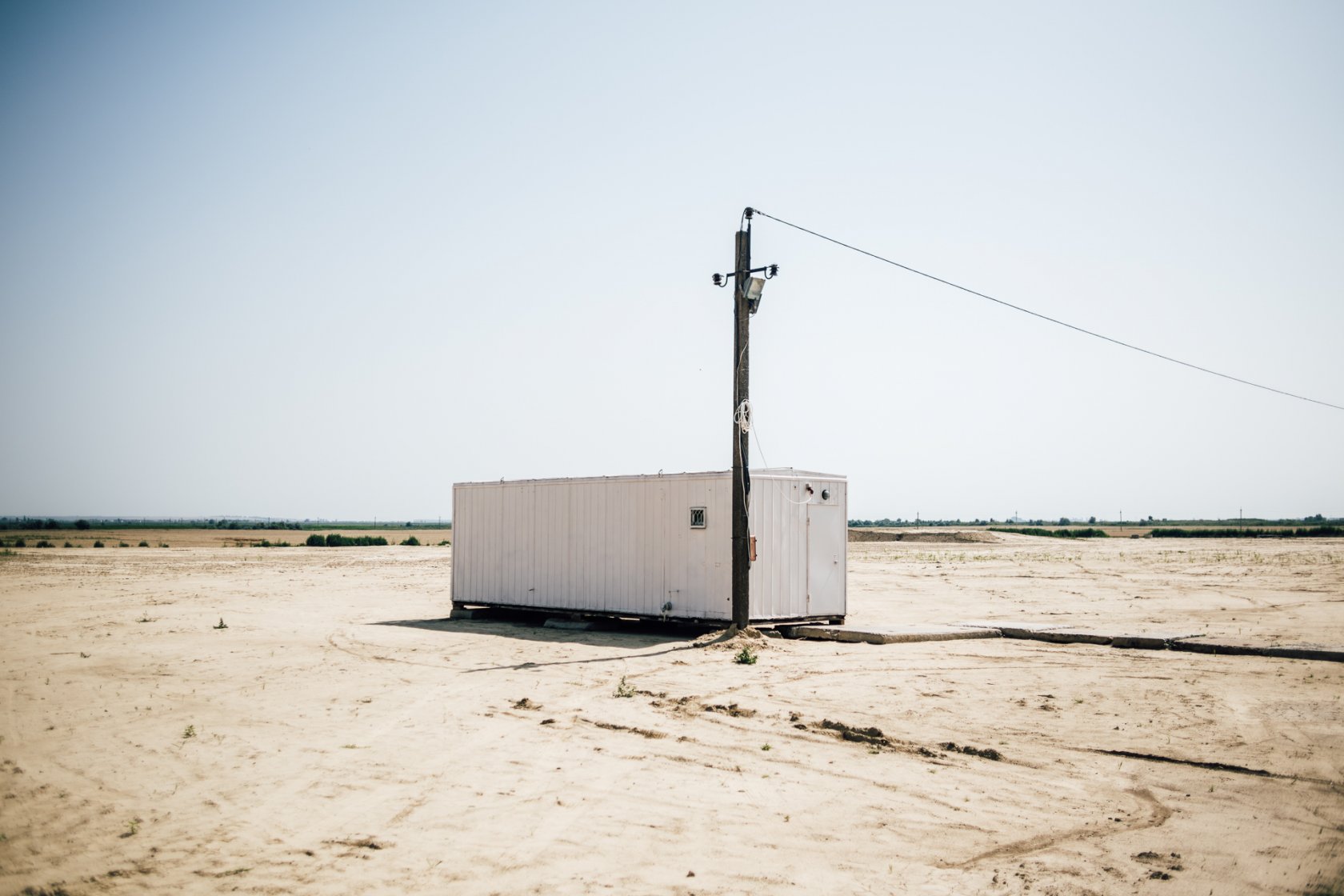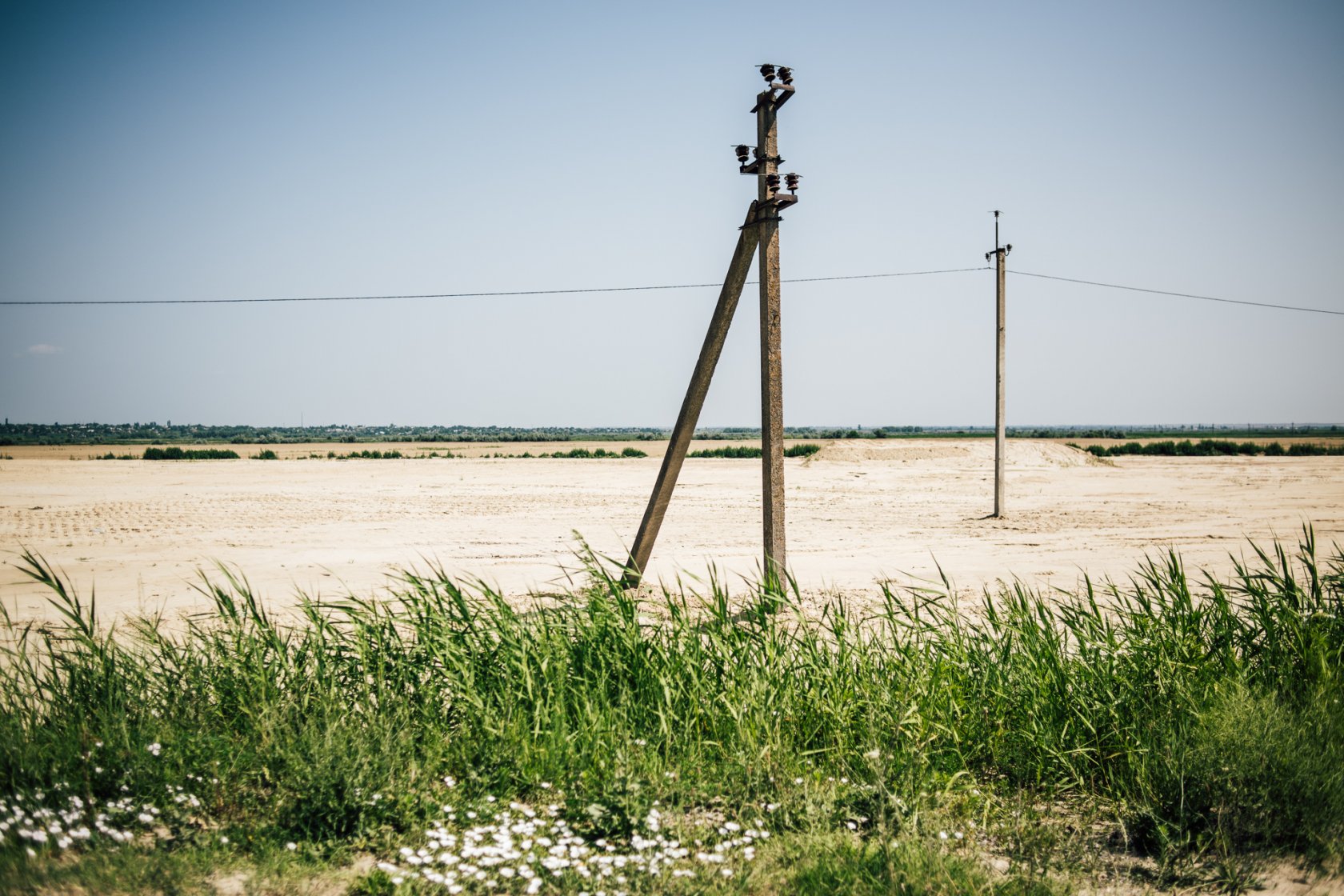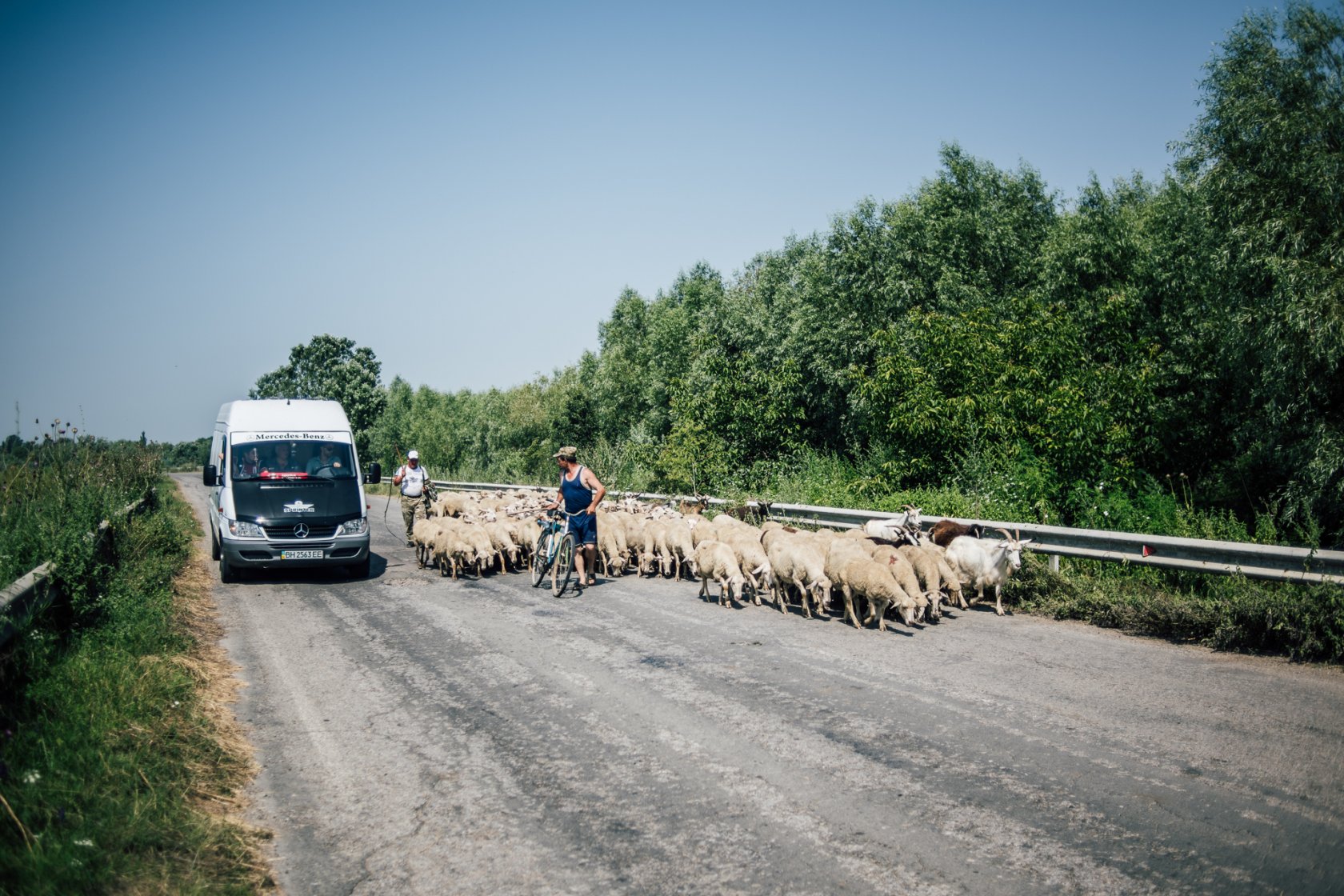FONDATION HIRONDELLE // Projet ukraine
Bessarabia,
the forgotten region
In the west of Odessa, on the road to Romania, reforms are failing, while entire cities and villages are struggling to survive
text: Iryna Kyporenko (with stephane siohan) - photo & video: sergiy polezhaka
In Artsyzk, Reni & Vizirka (Odessa region)
Eighteen months ago, administrative reform was launched in the Odessa region. During this time, only 40 out of 490 city councils decided to join forces and create "communities", bringing the total number of hromada (communities) in the largest region of the country to 8. According to Julia Molodozhen, the Director of the Reforms Office in the Odessa region, the decentralization process is slow due to certain political forces, business and private conflicts and society's unwillingness to take responsibility and be interested in local politics.
"Civil society is immature, especially in rural areas. Most people do not want to change their way of life, or take an interest in where their taxes spent. No one wonders why the same parts of the roads are repaired each year! Authorities have been elected, but they cannot adapt. This is why too few people are becoming active. Most people see the source of problems coming from the national government and they ignore the importance of local authorities," she says.
In some cases, businessmen have begun to take an interest in decentralization, but only if it has an impact on their business, for example in the agricultural sector. In general, conflicts remain between village mayors, local deputies and local residents concerning the uniting of various communities around a city.
In some cases, businessmen have begun to take an interest in decentralization, but only if it has an impact on their business, for example in the agricultural sector. In general, conflicts remain between village mayors, local deputies and local residents concerning the uniting of various communities around a city.
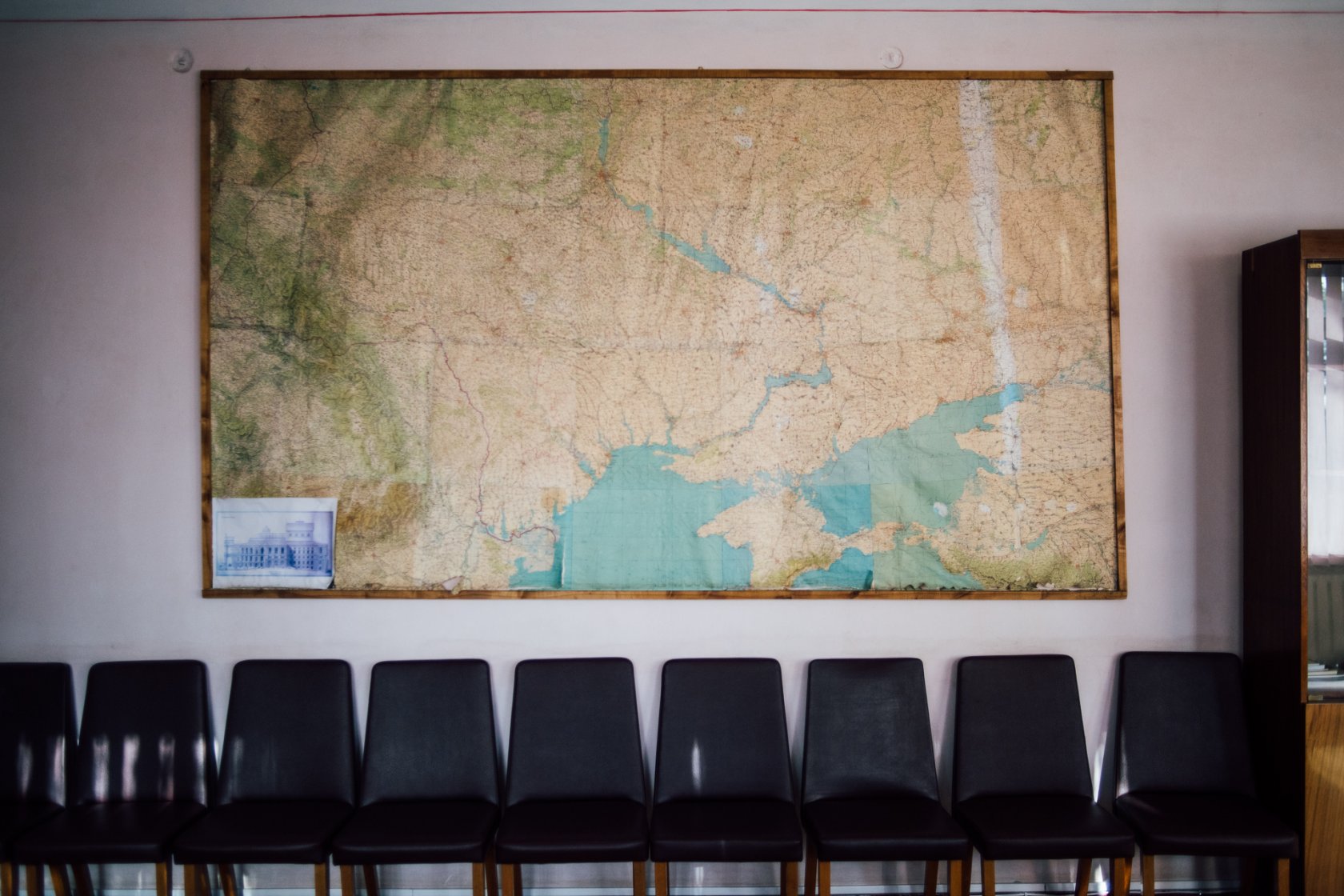
In the offices of the Artsyz local administration, the map of Ukraine has not changed since Soviet times.
"Several representatives of local authorities who are caught in the middle of conflicts between political or business interests, simply take a wait-and-see attitude or even declare their unwillingness to discuss the process of decentralization", Molodozhen says.
So we headed out on the roads of Bessarabia, or what remains of them, to see how national reform and decentralization are playing out, if decentralization has been able to boost the economy, and how the populations in these regions view these evolutions. The towns and villages of Bessarabia may seem different at first glance, but in fact most are facing the same challenges.
So we headed out on the roads of Bessarabia, or what remains of them, to see how national reform and decentralization are playing out, if decentralization has been able to boost the economy, and how the populations in these regions view these evolutions. The towns and villages of Bessarabia may seem different at first glance, but in fact most are facing the same challenges.
The center that everyone wants to become
Our first stop was Artsyz, 160 kilometers west of Odessa. In the center of this small town of 15,000 inhabitants, a monument catches your eye. It's not the silhouette of Lenin, which has already been taken down elsewhere in town, but rather a rarer sight in Ukraine: a statue of Karl Marx covered in gold paint. "We took down Lenin, but Marx is above all else an economist. It's not his fault what happened in the Soviet Union, I couldn't take it down," says a smiling Sergey Parpoulansky, the head of the Artsyz raion, a raion destined to become a "community" with the new decentralization law.
Up until several months ago Parpoulansky, not yet 30, was an investment banker in Kiev. Born in Artsyz, he studied in the Ukrainian capital and stayed there following graduation to pursue his career. But he then decided to return to his home region at the time of the arrival of the Georgian Mikheil Saasashvili as head of the Odessa region, to bring back life to this abandoned land.
A major supporter of the Georgian bulldozer, Parpoulansky completely supports the decentralization process in the Odessa region. But he has come to understand the problems and difficulties that it brings to the surface. Around Artsyz there are 17 villages that with the new law should make up 3 hromada, the new territorial communities. But these reforms are blocked for several reasons: geographic constraints, the multi-national character of the region, as well as a lack of interest on the part of certain politicians and decision-makers. What is the most striking is the chronic inability to reach agreements and comprises.
Up until several months ago Parpoulansky, not yet 30, was an investment banker in Kiev. Born in Artsyz, he studied in the Ukrainian capital and stayed there following graduation to pursue his career. But he then decided to return to his home region at the time of the arrival of the Georgian Mikheil Saasashvili as head of the Odessa region, to bring back life to this abandoned land.
A major supporter of the Georgian bulldozer, Parpoulansky completely supports the decentralization process in the Odessa region. But he has come to understand the problems and difficulties that it brings to the surface. Around Artsyz there are 17 villages that with the new law should make up 3 hromada, the new territorial communities. But these reforms are blocked for several reasons: geographic constraints, the multi-national character of the region, as well as a lack of interest on the part of certain politicians and decision-makers. What is the most striking is the chronic inability to reach agreements and comprises.
"Our main challenge is the large size of the villages in this region, the absence of leaders and the inability to bring together five or six similar villages around only one center town," explains Parpoulansky. He also highlights the fact that there exist several different ethnic groups in the area: Ukrainians, Russian, Romanian-speaking Moldovans, Bulgarians. "There is a lot of negotiating going on: why should we be beneath the others? Why can't my village be the center of the community?"
Most villages are, however, similar. They have the same types of business, schools and clinics. The differences are small. "The last time that we organized a meeting each mayor stood up and said he wanted to put the center of the community in his village; the problem is that there are 17 mayors who all want the same thing! We have to reach a compromise, and the only proposal that will work would be to put the center in Artsyz, the only real town," explains Parpoulansky.
Moreover, according to the young mayor, the local Member of Parliament, Anton Kisse, is not making things easier. This powerful politician, formerly tied to Viktor Yanukovych's Party of the Regions, is mobilizing opponents to decentralization. He has been highlighting the inefficiency of the administrative reforms and claims that it is not possible for the different nationalities to unify. Often considered to represent pro-Russian forces in the region, he is simply not interested in the changes that decentralization brings.
A strident reformist, Parpoulansky admits that since the reforms have been launched, nothing has changed. There are still no united "communities". Worst yet, according to him there has even been a slide backwards, which can be explained by the incentives to decentralization. "The problem is that there is less and less money for our budget coming from the central government," the young local leader underlines, who has not received "any transfer of power." There is thus no one who can explain the problems and show the population that there are new opportunities to manage land and financial resources. "So people do not understand why they need decentralization," Parpoulansky sighs.
Most villages in the region operate with an annual budget of 1 million hryvnias (around 35,000 euros). This budget is usually generated through local land management. When a village has more land and therefore a larger budget – such is the case for the village of Pavlivka, with a budget of 5 million hryvnias (around 177,000 euros) – its population does not understand why they should share with others.
There is therefore a need to educate and explain to the population that supporting neighboring villages is also a question of creating new employment opportunities and ensuring that certain villages do not simply disappear. It's important to introduce projects and initiatives across all villages and to explain the benefits of reform to citizens.
"If we had real leaders in these villages, we could unify these communities and we wouldn't have these problems," Parpoulansky believes, highlighting the lack of administrative, organizational, and managerial capacities, as well as a fear of assuming responsibilities. "Lots of people only watch Russian television and are not interested in these reforms, they think that things are going badly; we are losing the information war on these issues."
Most villages are, however, similar. They have the same types of business, schools and clinics. The differences are small. "The last time that we organized a meeting each mayor stood up and said he wanted to put the center of the community in his village; the problem is that there are 17 mayors who all want the same thing! We have to reach a compromise, and the only proposal that will work would be to put the center in Artsyz, the only real town," explains Parpoulansky.
Moreover, according to the young mayor, the local Member of Parliament, Anton Kisse, is not making things easier. This powerful politician, formerly tied to Viktor Yanukovych's Party of the Regions, is mobilizing opponents to decentralization. He has been highlighting the inefficiency of the administrative reforms and claims that it is not possible for the different nationalities to unify. Often considered to represent pro-Russian forces in the region, he is simply not interested in the changes that decentralization brings.
A strident reformist, Parpoulansky admits that since the reforms have been launched, nothing has changed. There are still no united "communities". Worst yet, according to him there has even been a slide backwards, which can be explained by the incentives to decentralization. "The problem is that there is less and less money for our budget coming from the central government," the young local leader underlines, who has not received "any transfer of power." There is thus no one who can explain the problems and show the population that there are new opportunities to manage land and financial resources. "So people do not understand why they need decentralization," Parpoulansky sighs.
Most villages in the region operate with an annual budget of 1 million hryvnias (around 35,000 euros). This budget is usually generated through local land management. When a village has more land and therefore a larger budget – such is the case for the village of Pavlivka, with a budget of 5 million hryvnias (around 177,000 euros) – its population does not understand why they should share with others.
There is therefore a need to educate and explain to the population that supporting neighboring villages is also a question of creating new employment opportunities and ensuring that certain villages do not simply disappear. It's important to introduce projects and initiatives across all villages and to explain the benefits of reform to citizens.
"If we had real leaders in these villages, we could unify these communities and we wouldn't have these problems," Parpoulansky believes, highlighting the lack of administrative, organizational, and managerial capacities, as well as a fear of assuming responsibilities. "Lots of people only watch Russian television and are not interested in these reforms, they think that things are going badly; we are losing the information war on these issues."
A dying port and thriving Soviet mindsets
Just across from Reni, there are still no boats to reach the other side of the Danube in Romania. Instead, travellers have to go by road through Moldova and pass through 4 customs posts.
The situation seems rather dire, yet in the town of Reni, at the end of the road, things are even worse. Reni is an old industrial port on the Danube that is now in theory a crossing on the way to Moldova and Romania, but in reality is more of a dead end, now that traffic on the river has dried up.
In this town made up of 50 percent Romanian-speaking Moldavians, 17 percent Ukrainians and 15 percent Russians, the economy is at a near standstill. The factories are closed and infrastructure is falling apart. "Since Ukraine's independence, the central authorities have not paid even the slightest attention to Bessarabia, that's where all our problems are coming from," believes Sergiy Bilyouk, the head of administration of the Reni region.
"Why does Ukraine need Bessarabia? These last few years, the region was only given leftovers," he continues. "They paid more attention to the border regions in the west, Transcarpathia or Lviv. I don't want to make comparisons, but the road from Odessa to Reni is also extremely strategic. It leads to the southern border of the European Union, to Greece, the Balkans, Turkey." Sergey Bilyouk is bitter: "perhaps someone in Kiev was not interested in developing this region."
The region is suffering because it does not have the authority or stature to manage its own resources; at the same time, people do not want to be involved in the decentralization process because they do not believe that things can change. Moreover, they are not used to making decisions for themselves, by themselves. A legacy from the past.
"Look, today you drove on the highway from Odessa to Reni, there were potholes everywhere; we don't even have the right to cut the grass on the side of the road, because all decisions surrounding the roads are made in Kiev," explains Bilyouk. "The region can't even decide who will cut the grass and how we will pay for it."
The question of authority is also an issue impacting the region's lakes. 35,000 hectares, or half of the region of Reni, is covered by lakes. However, the local authorities do not have rights over them. All resources generated by fishing or leasing go directly to Kiev.
Reni, a former major port on the Danube, is in crisis. 3,500 people used to work in the port, but now there are less than 400. Twelve years ago, someone in the government decided to remove a part of the railroad system, and now all transport of goods goes towards Moldova. Between 1997 and 2001, the Ukrainian and Moldovan governments exchanged land and Ukraine gave Moldova a strip of 400 meters along the Danube to create a free port, Giurgiulesti, and thus gave Chisinau access to international maritime trade. The agreement was signed at the time by no one other than Petro Porochenko! Since then, Reni has sunk into oblivion.
According to Sergey Bilyouk, activities at the port last year were "zero". All commercial activities on the river have been taken over by the Moldavian port Giurgiulesti, located only 3 kilometers away. Since Mikheil Saasashvili took over the region of Odessa in the summer of 2015, he has been promising to build a ferry terminal connecting Reni to Romania, while there is today no barge that carries out cross-border trade. Excavation and grading for the new terminal have begun (see photos below), but construction has come to a halt.
In this town made up of 50 percent Romanian-speaking Moldavians, 17 percent Ukrainians and 15 percent Russians, the economy is at a near standstill. The factories are closed and infrastructure is falling apart. "Since Ukraine's independence, the central authorities have not paid even the slightest attention to Bessarabia, that's where all our problems are coming from," believes Sergiy Bilyouk, the head of administration of the Reni region.
"Why does Ukraine need Bessarabia? These last few years, the region was only given leftovers," he continues. "They paid more attention to the border regions in the west, Transcarpathia or Lviv. I don't want to make comparisons, but the road from Odessa to Reni is also extremely strategic. It leads to the southern border of the European Union, to Greece, the Balkans, Turkey." Sergey Bilyouk is bitter: "perhaps someone in Kiev was not interested in developing this region."
The region is suffering because it does not have the authority or stature to manage its own resources; at the same time, people do not want to be involved in the decentralization process because they do not believe that things can change. Moreover, they are not used to making decisions for themselves, by themselves. A legacy from the past.
"Look, today you drove on the highway from Odessa to Reni, there were potholes everywhere; we don't even have the right to cut the grass on the side of the road, because all decisions surrounding the roads are made in Kiev," explains Bilyouk. "The region can't even decide who will cut the grass and how we will pay for it."
The question of authority is also an issue impacting the region's lakes. 35,000 hectares, or half of the region of Reni, is covered by lakes. However, the local authorities do not have rights over them. All resources generated by fishing or leasing go directly to Kiev.
Reni, a former major port on the Danube, is in crisis. 3,500 people used to work in the port, but now there are less than 400. Twelve years ago, someone in the government decided to remove a part of the railroad system, and now all transport of goods goes towards Moldova. Between 1997 and 2001, the Ukrainian and Moldovan governments exchanged land and Ukraine gave Moldova a strip of 400 meters along the Danube to create a free port, Giurgiulesti, and thus gave Chisinau access to international maritime trade. The agreement was signed at the time by no one other than Petro Porochenko! Since then, Reni has sunk into oblivion.
According to Sergey Bilyouk, activities at the port last year were "zero". All commercial activities on the river have been taken over by the Moldavian port Giurgiulesti, located only 3 kilometers away. Since Mikheil Saasashvili took over the region of Odessa in the summer of 2015, he has been promising to build a ferry terminal connecting Reni to Romania, while there is today no barge that carries out cross-border trade. Excavation and grading for the new terminal have begun (see photos below), but construction has come to a halt.
"People still live like they did under the Soviet Union, they are used to someone deciding for them," explains Sergiy Bilyouk. "I've been in my position for 8 months now, and I can't break these patterns in one day. It's going to take years, generations. It's still too soon to give people real control over the future of their villages or regions with expanded powers."
We head further east. The road from Odessa to Yuzhny, which goes through the village of Vyzyrka, seems to be the most comfortable in the whole region. It was recently repaired with funding from the region's budget. But of course there was not enough money to go all the way to Yuzhny, so the last 5 kilometers, covered in potholes, is still being worked on. But despite this, the roads are in a better state than those in Bessarabia.
We head further east. The road from Odessa to Yuzhny, which goes through the village of Vyzyrka, seems to be the most comfortable in the whole region. It was recently repaired with funding from the region's budget. But of course there was not enough money to go all the way to Yuzhny, so the last 5 kilometers, covered in potholes, is still being worked on. But despite this, the roads are in a better state than those in Bessarabia.
Bigger budgets and greater competition for resources
As we near Vyzyrka, a field of sunflowers on one side of the road is contrasted with a very different reality on the other: a nearly autonomous industrial city built on the sea. This is the site of the country's most important dry cargo port. Major installations have been built, and warehouses and oil extractive companies such as TIS, Delta Wilmar CIS, and Alseeds Black Sea have arrived. There are also oil transshipment terminals as well as the brand new cereal terminal for the American company Cargill.
Recent investments have reached some 100 million dollars. Thanks to the development of this port, whose construction began in 1994, Vyzyrka is much better off than most small Ukrainian towns. Half of the town's budget comes from taxes payed by the companies based here.
Recent investments have reached some 100 million dollars. Thanks to the development of this port, whose construction began in 1994, Vyzyrka is much better off than most small Ukrainian towns. Half of the town's budget comes from taxes payed by the companies based here.
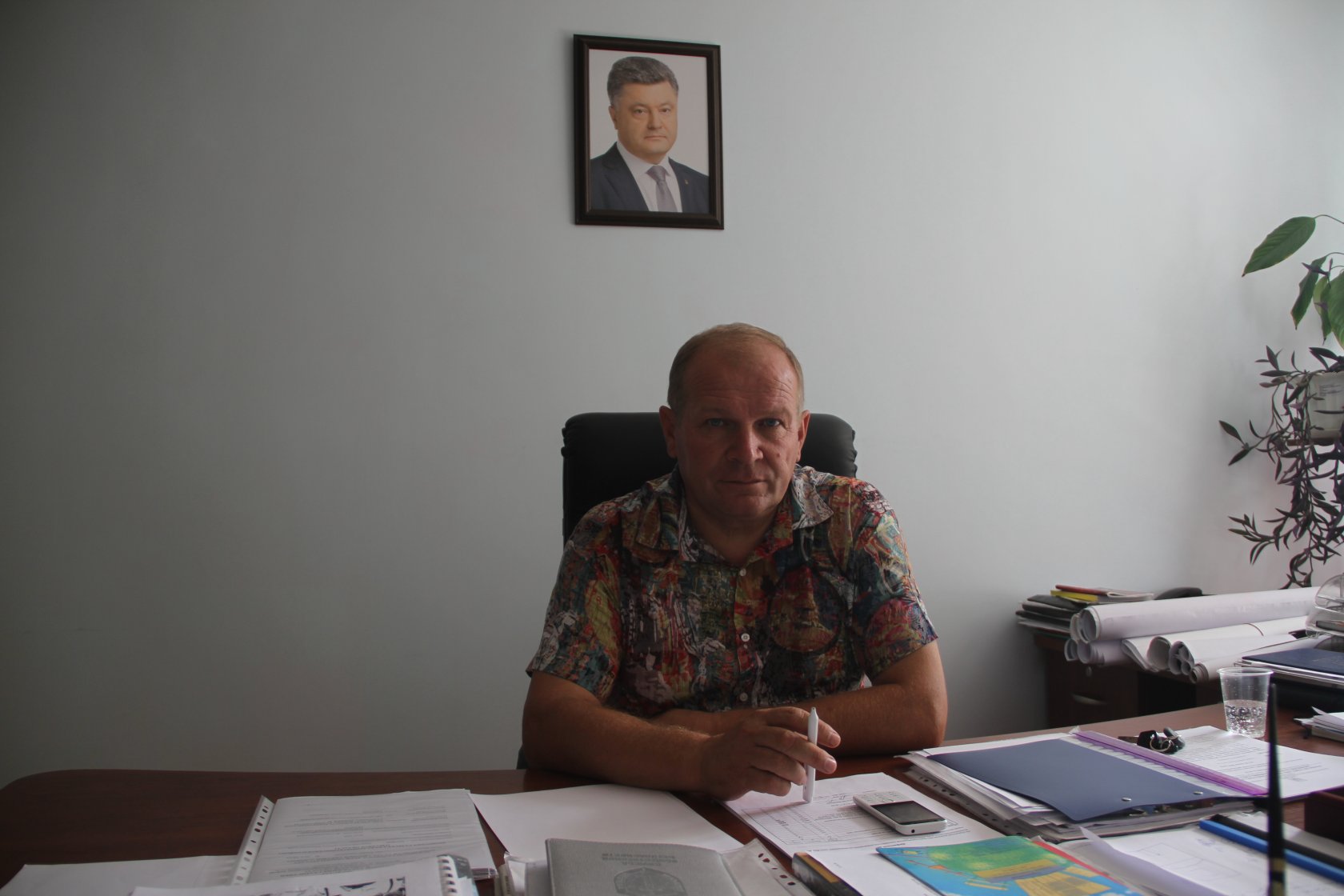
After two mandates, Aleksandr Tokmenninov, head of administration of Vyzyrka, managed to bring fifteen villages together so as to improve the community's budgets.
The town's mayor, Aleksandr Tokmeninov, who used to work for one of these companies, has been in his role for 2 years. He began the process of uniting the surrounding villages in 2015, and things have been progressing much faster than in other parts of the region.
"Here, everything has happened as was planned in the law," he explains. "First, we took the decision during a council meeting, then our citizens accepted that surrounding villages join us and that Vyzyrka becomes the center of a community made up of the villages of Novyi Bellary, Sychavka, Lyubopol, and Pershotravneve. We organized meetings in all of these villages. At the same time, the city of Yuzhny made the same proposal to these villages and so there is a sort of competition between us."
But if Vyzyrka is a village, Yuzhny is a real city. "We've urged these villages to join us, because their villagers will not be satisfied being untied with a city, Tokmeninov believes. "Our village has 2,000 inhabitants, while the city of Yuzhny has 35,000. In terms of representation, these villages would not have even one deputy in the community."
"Here, everything has happened as was planned in the law," he explains. "First, we took the decision during a council meeting, then our citizens accepted that surrounding villages join us and that Vyzyrka becomes the center of a community made up of the villages of Novyi Bellary, Sychavka, Lyubopol, and Pershotravneve. We organized meetings in all of these villages. At the same time, the city of Yuzhny made the same proposal to these villages and so there is a sort of competition between us."
But if Vyzyrka is a village, Yuzhny is a real city. "We've urged these villages to join us, because their villagers will not be satisfied being untied with a city, Tokmeninov believes. "Our village has 2,000 inhabitants, while the city of Yuzhny has 35,000. In terms of representation, these villages would not have even one deputy in the community."
Even if the community of Vyzyrka is not yet official, it is helping its disadvantaged neighbors. For example, 7 million hryvnias (around 25,000 euros) were allocated to repairing the roads in Lyubopol. In the village of Novyi Bellary there is no nursery school, but a private regional company has financed the rental of a vehicle that will transport children to a neighboring village.
Alaksandr Tokmeninov is convinced that choosing Vyzyrka as the center of the community was a wise choice. The port zone is under development, and 70 companies are registered on the community's territory, which has a school, a clinic, a modern cultural center, a co-working space for the employees of companies based there, an important farm, and a recently equipped fire station.
"If we go ahead with the unification of the villages, we will have a budget of 82 million hryvnias (2.9 million euros) for a population of a bit less than 6,000," he explains. The biggest part will be allocated to our town and Novyi Bellary, while last year our budget was only 15 million hryvnias (around 53,000 euros). If we do the math, that would provide 15,000 hryvnias (around 530 euros) for each citizen. What more do we need to live well?"
Alaksandr Tokmeninov is convinced that choosing Vyzyrka as the center of the community was a wise choice. The port zone is under development, and 70 companies are registered on the community's territory, which has a school, a clinic, a modern cultural center, a co-working space for the employees of companies based there, an important farm, and a recently equipped fire station.
"If we go ahead with the unification of the villages, we will have a budget of 82 million hryvnias (2.9 million euros) for a population of a bit less than 6,000," he explains. The biggest part will be allocated to our town and Novyi Bellary, while last year our budget was only 15 million hryvnias (around 53,000 euros). If we do the math, that would provide 15,000 hryvnias (around 530 euros) for each citizen. What more do we need to live well?"

